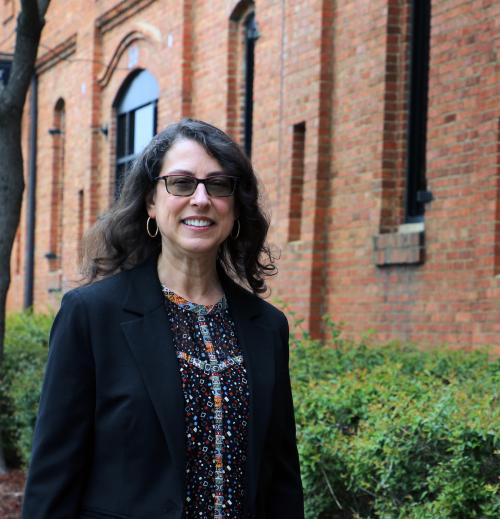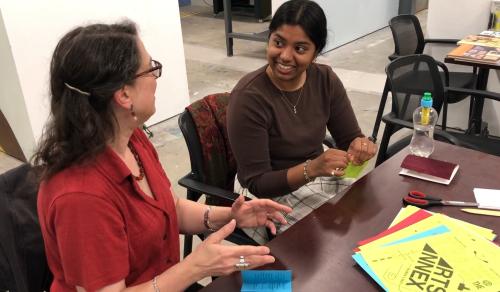
Blog
Demystifying Publishing and Making Connections: An Interview with Sylvia Miller, FHI's Director of Scholarly Publishing and Research Development
Director of Scholarly Publishing and Research Development Sylvia Miller wears many hats in her work at FHI: consulting with faculty and students on their publishing and grant plans and proposals; managing Faculty Book Manuscript Workshops; spearheading Publishing Humanities Initiative events; and liaising with Duke University Libraries, Duke University Press, and other campus units and programs on publishing-related issues and projects. Outside of work, Miller is no less busy: a dedicated book artist, Miller creates book art and teaches book arts workshops through her participation in Triangle Book Arts. Speaking with FHI's Assistant Director of Communications Michaela Dwyer, Miller discusses what led her to her current work at FHI, how early-career faculty can get connected to publishing support at Duke, and the thematic diversity of the Publishing Humanities Initiative programming series at FHI.
Note: this conversation has been edited and condensed for greater clarity.

Michaela Dwyer: I notice you have many encyclopedias in your office.
Sylvia Miller: I had a long career in book publishing in New York. Over time, I became a specialist in encyclopedias in the humanities and social sciences for all kinds of libraries. So, yes, I love my multi-volume sets. They remind me of topics that I once took some kind of deep dive into.
[In my work] I'm working very hard to make the work of experts understandable to a general audience. And having a lot of practice at that has turned out to be very handy when working with faculty — not only with book proposals, but also with fellowship and grant proposals that will be read by reviewers who may be highly educated and very smart and interested in your work, but that doesn't mean they know your terminology or they're going to understand your concepts right off the bat.
MD: Walk us through your scope of work at FHI.
SM: With the “scholarly publishing” side of my role, I manage the Faculty Book Manuscript Workshops. It's an opportunity for faculty to have a peer review in-person: a discussion about a completed draft manuscript. I bring to that my experience of publishing. In addition to arranging the workshops, I sometimes help the awardees choose the right publisher for them. I also help them with some follow-up the workshop.
I also have the “research development” part of my role, which speaks to grants and funding opportunities.
MD: What happens when a faculty member is awarded a Book Manuscript Workshop?
It basically means that FHI is going to manage all the logistics for the workshop so that you can finish your manuscript. We pay an honorarium to the external reviewers and [cover] the budget for travel. I usually meet right away with the awardee and explain how it all works. We decide together who will be invited.
We have a tried and true schedule for the four-hour workshop that works very well. Sometimes toward the end of the workshop, there's a real mind meld in the room and the moderator is able to summarize takeaways for the author. I take a ton of notes.
People like to come and participate. I think they end up finding that it's the kind of conversation they went into academia to have and don't often get to have.
"The more you practice explaining your work to someone like me ... the better you get at it."
MD: Say I’m a faculty member who wants to approach you about moving through the full lifecycle of preparing a manuscript. How would that conversation start? What would some steps along the way look like?
SM: Sometimes it starts with a proposal draft someone brings to me. I put on my encyclopedia editor hat or grant writer hat and I ask questions to clarify things. And then I'll write a covering memo that summarizes the changes I'm recommending and why.
Sometimes the first step is that someone wants to just come and tell me about their project. That's a very useful exercise, because the more you practice explaining your work to someone like me — I'm educated, I'm interested, but I don't know anything about it — the better you get at it.

MD: What are some pathways that your collaboration [with faculty, postdocs, or graduate students] could take?
SM: I’ll tap into my research administration networks across campus, with attention to what networks support humanities and interpretive social sciences. I'll also make connections for people; for example, connecting an author with someone who is terrific at searching the database for the funding opportunities to come up with a budget for a grant. I try to be a connector for all the other people who might be needed [for a book project].
And for book proposals in particular, I love to explain what goes on inside a publishing company. When you're writing the book proposal, what you’re really doing is helping your editor advocate for you. I know what your editor needs: for her bosses, her board, the sales and marketing and publicity people.
I had a recent FHI visiting fellow ask me for a consultation about her five-year publishing plan: a lot of ideas and questions about how her articles would or would not lead to a book. I tried to answer all her questions and clarify certain mysteries for her. What I'm really happy about is that after she left FHI, having followed that [publishing plan], she told us she got tenure.
Idealistically, I want you to get your book published so your ideas will be disseminated in the world, but practically, I want you to be published so you can get promoted or get tenure.
MD: What advice would you give to new faculty beginning their publishing journey?
SM: New faculty, if they haven't published a book yet, likely have a dissertation that they can turn into a book. We can talk about that. The core of the Publishing Humanities Initiative event series has always been what I call “publishing literacy.” One of the basic events we’ve presented a few times is about how a dissertation becomes a book.
MD: Tell us more about the Publishing Humanities event series. How has its focus evolved over time, and what does it offer?
SM: I wanted to demystify publishing and bring out the different aspects and roles within publishing. The other goal was to help faculty and graduate students navigate the publishing world — to navigate its different levels to reach multiple audiences and advance their careers. And sometimes people who attend are interested in careers in publishing.
As time went on, I started to take on more issues prompted by graduate student groups or faculty interests. We had a symposium on international copyright and translations, we had events on publishing for BIPOC scholars, on diversity in publishing, on radical mapping. We've had various events on innovative forms and formats. And lately, in relation to programming we’ve done within FHI at large, I’ve arranged some events about publishing in the arts.
Faculty, postdocs, and graduate students interested in working with Sylvia Miller on publishing and research projects can email sylvia.miller@duke.edu.